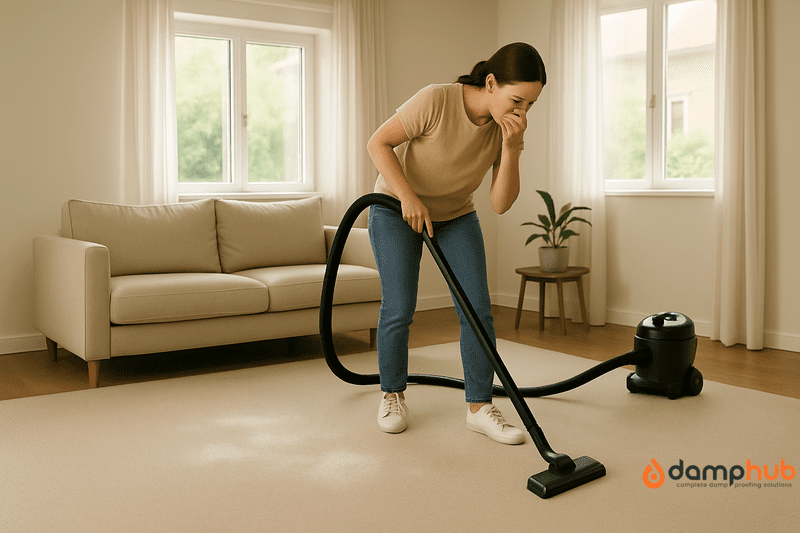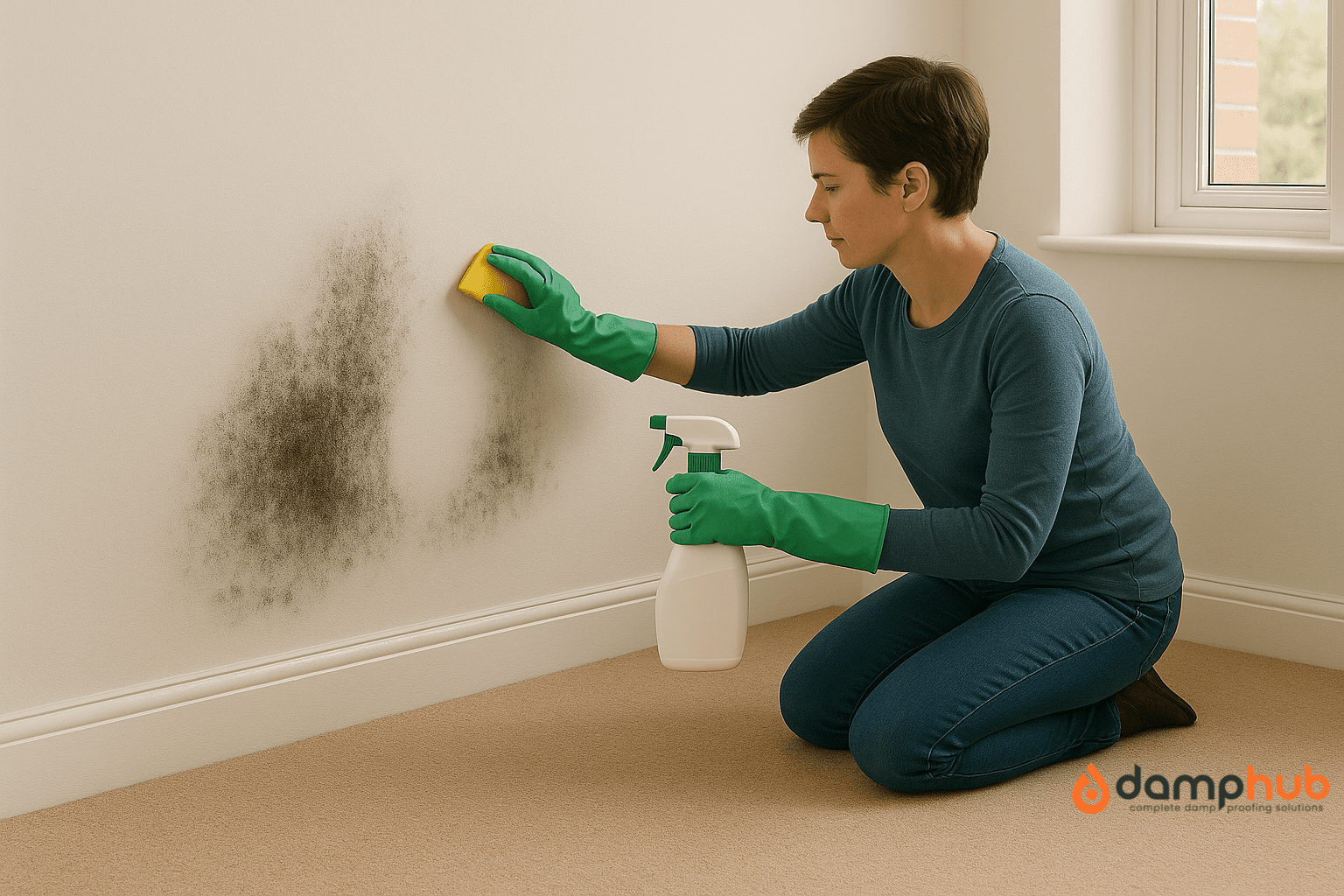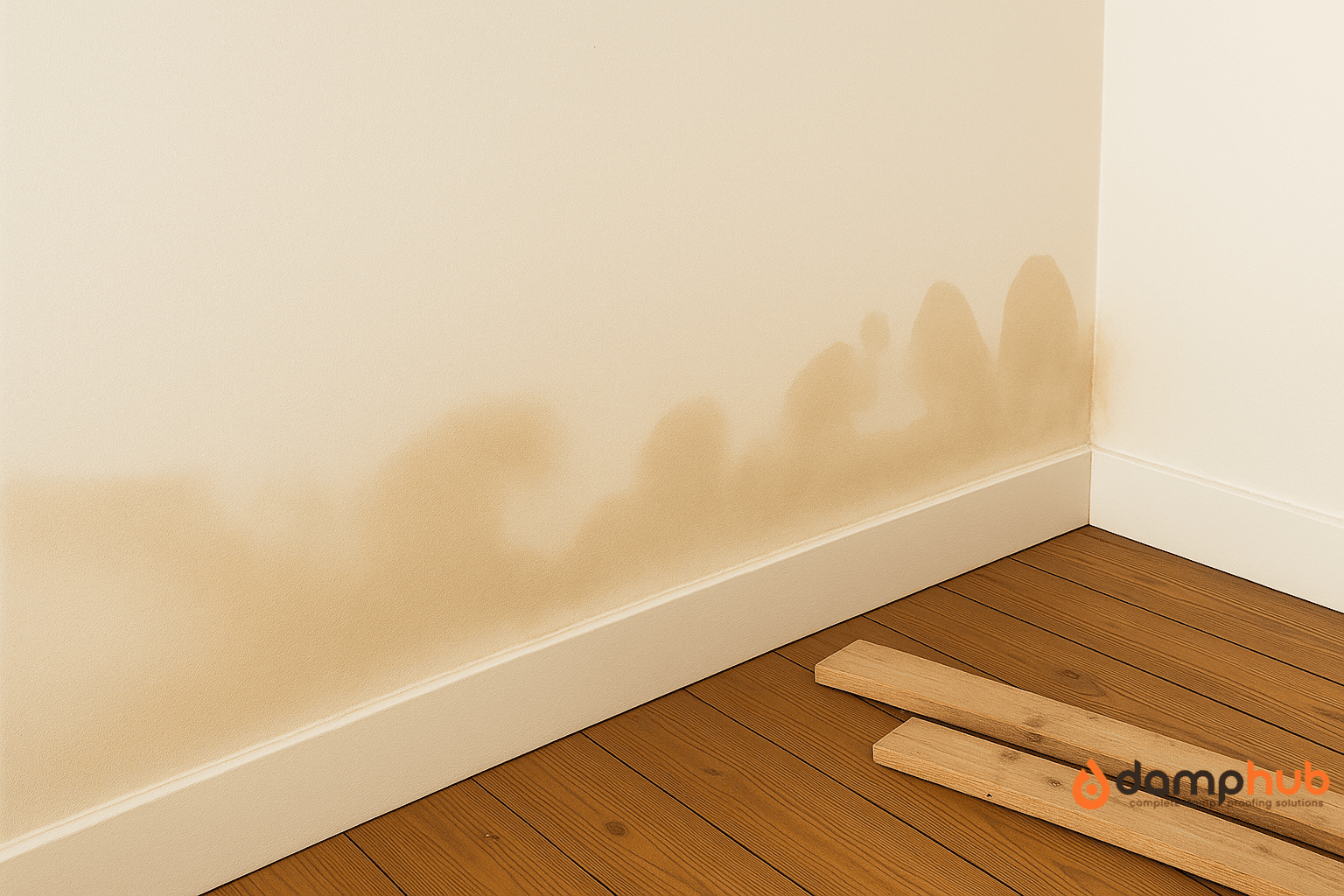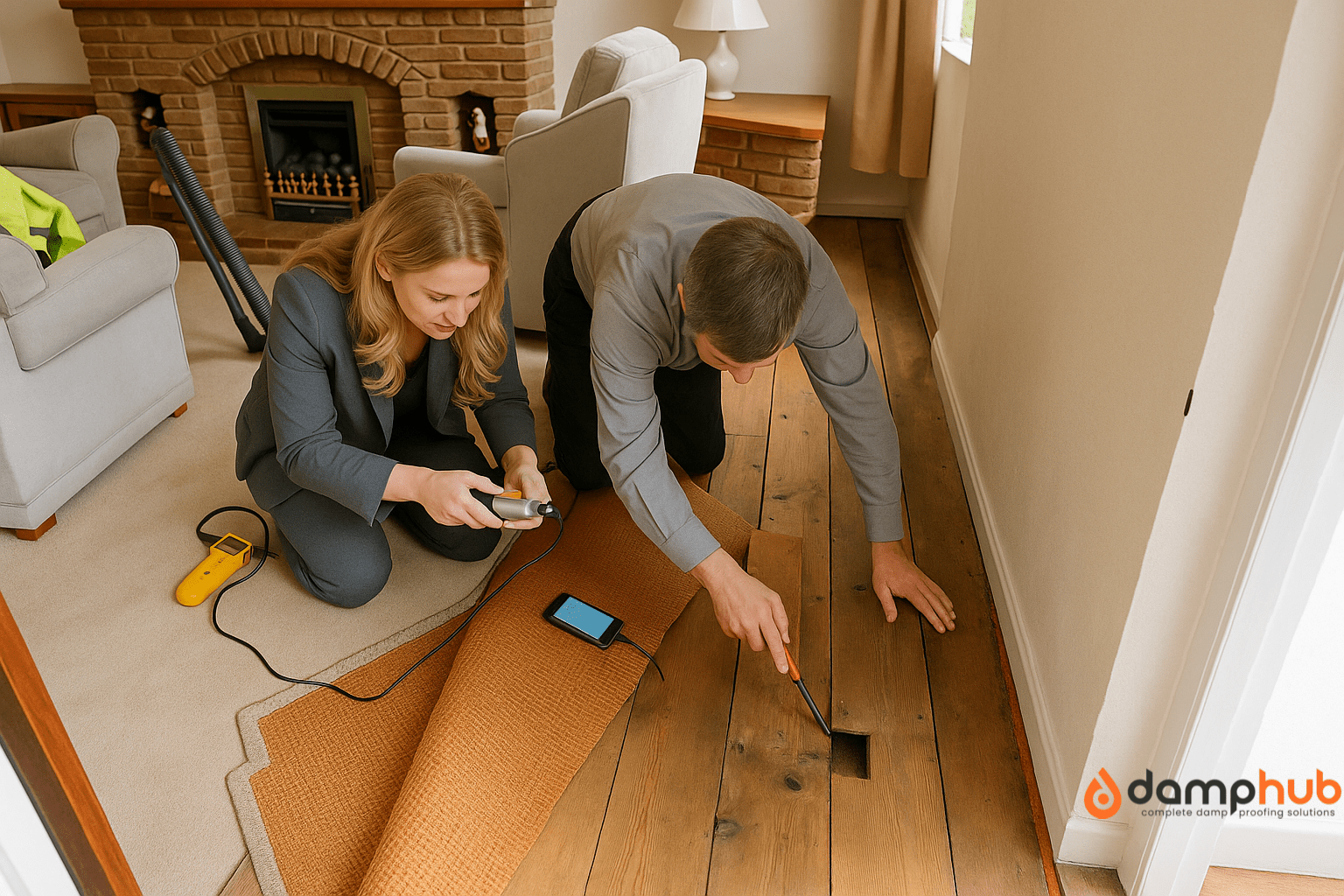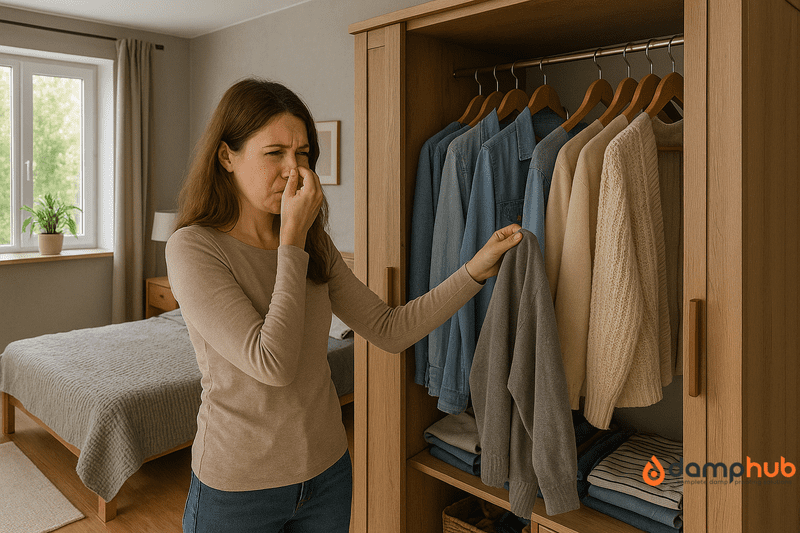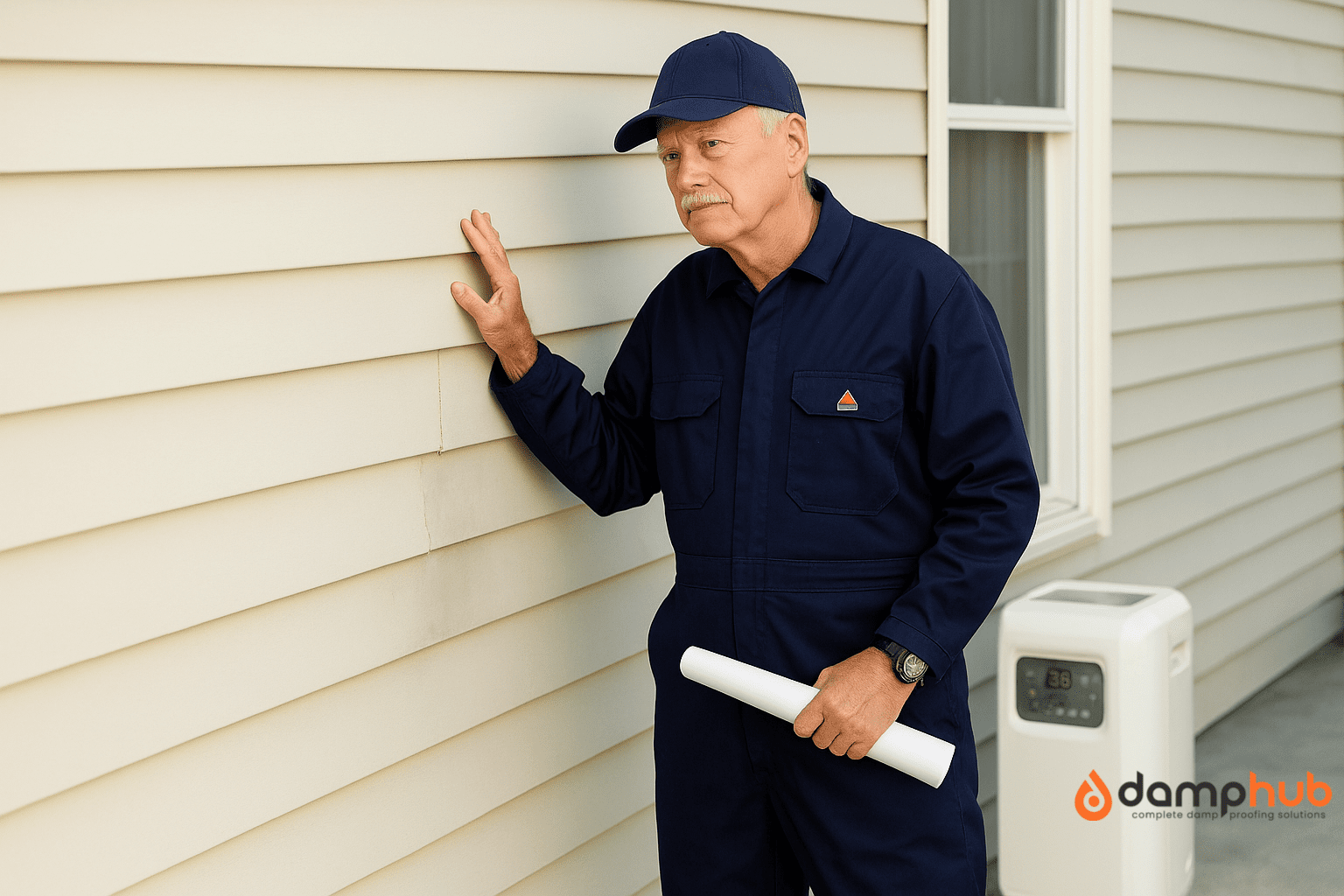
Have you experienced this?
A musty smell in your home or a damp patch that never dries up?
You’ve aired the place, wiped the spots off the wall, even run a dehumidifier — but the damp keeps creeping back.
Friends tell you it’s normal, especially in old UK homes.
But deep down, you know something’s wrong. You’re not imagining it.
Damp is one of the most common issues in UK homes, affecting up to 20% of properties.
If you suspect your home is affected, choosing the right damp surveyor is the first step to getting real answers.
In this guide, we’ll show you exactly what to look for — and what to avoid — so you don’t waste time or money on the wrong advice.
👉 Must Read: How Long Does a Damp Survey Take? A Step-by-Step Timeline
Why Choosing the Right Surveyor Matters
Damp can affect your home’s structure, health, value, and overall comfort.
A good damp surveyor doesn’t just spot surface symptoms; they trace moisture back to its source and advise on long-term solutions.
A poor-quality surveyor, on the other hand, might misdiagnose the problem, recommend unnecessary treatments, or overlook key causes altogether.
That’s why it’s critical to take your time when selecting a surveyor—the right one can save you time, money, and further damage down the line.
Step 1: Look for Relevant Qualifications
Not all surveyors are damp specialists.
The title “surveyor” is broad, so it’s important to choose someone with the right expertise in diagnosing and reporting damp issues in buildings.
Key qualifications to look for include:
- CSRT (Certified Surveyor in Remedial Treatment) – This shows the surveyor is trained in identifying and recommending treatments for damp, timber decay, and related issues.
- CSTDB (Certificated Surveyor in Timber and Dampness in Buildings) – A broader qualification that covers both damp and timber problems in detail, often required for complex cases.
- Membership with the Property Care Association (PCA) – PCA members follow strict professional standards and are regularly audited for competence and ethics.
Building surveyors with damp expertise – Some chartered building surveyors also specialise in damp diagnosis, but you’ll need to confirm their specific experience and tools.
If you’re searching for a damp surveyor near me or an independent damp surveyor, always check their website or listing for these credentials—they’re a key sign of professionalism.
Step 2: Choose an Independent Damp Surveyor

An independent damp surveyor is not affiliated with a treatment company.
That means they have no incentive to recommend expensive work unless it’s genuinely needed.
In contrast, some surveyors are tied to companies that make money by installing damp-proofing systems or selling treatments.
This can lead to a conflict of interest.
If you’re aiming for an impartial assessment, seek out an independent damp surveyor near me to make sure the advice you get is unbiased and in your best interest.
Step 3: Ask the Right Questions
Before hiring any surveyor, ask these important questions:
- What qualifications do you hold? Look for recognised credentials like CSRT or PCA membership.
- Are you independent or linked to a treatment company? An independent damp surveyor offers unbiased advice without trying to sell you remedial work.
- What tools do you use? Moisture meters, thermal imaging, and hygrometers should be part of their kit.
- What does the survey include? A full assessment should cover internal and external areas and identify all potential damp sources.
- Will I get a written report? It should be detailed, with photos and recommendations. Ask how long it takes to receive.
- Do you have professional indemnity insurance? This protects you if something important is missed.
- Can I see a sample report or client feedback? A reputable damp surveyor should be able to provide this on request.
These questions help ensure you’re choosing a qualified professional, not just someone chasing damp surveyor jobs.
👉 Must Read: How Long Does a Damp Survey Take? A Step-by-Step Timeline

Step 4: Review What the Survey Includes
A good damp survey should offer more than just a visual check.
Look for these key elements, each of which plays a crucial role in diagnosing and solving moisture issues:
- Full internal and external assessment – A thorough inspection of the entire property helps identify all potential sources of damp, both outside and in.
- Use of moisture meters and thermal imaging – These tools detect hidden moisture behind walls and under floors, often missed by the eye alone.
- Diagnosis of rising damp, penetrating damp, and condensation – Understanding the specific type of damp is essential for recommending the right treatment.
- Evaluation of ventilation, insulation, and structural factors – Poor airflow, cold bridging, or damaged materials can all contribute to damp.
- Photographic documentation – Images help show exactly where issues are occurring and support any recommended works.
- Moisture readings and mapped problem areas – Accurate data helps pinpoint damp zones and track how serious the problem is.
- Clear, practical recommendations – The final report should outline what’s wrong, why it’s happening, and how to fix it, without upselling treatments.
If any of these elements are missing—or if there’s no written report provided—it’s a sign to look elsewhere.
👉 Must read: How to Hire an Independent Damp Specialist in London
Step 5: Check for Insurance and Guarantees
A qualified damp surveyor should hold professional indemnity insurance.
This protects you if their report contains an error or omission that leads to further issues or financial loss.
Some surveyors also offer a service guarantee—an assurance that they stand by their diagnosis and reporting.
It’s not a guarantee that damp won’t return (no one can offer that), but it reflects their confidence in the accuracy of their findings.
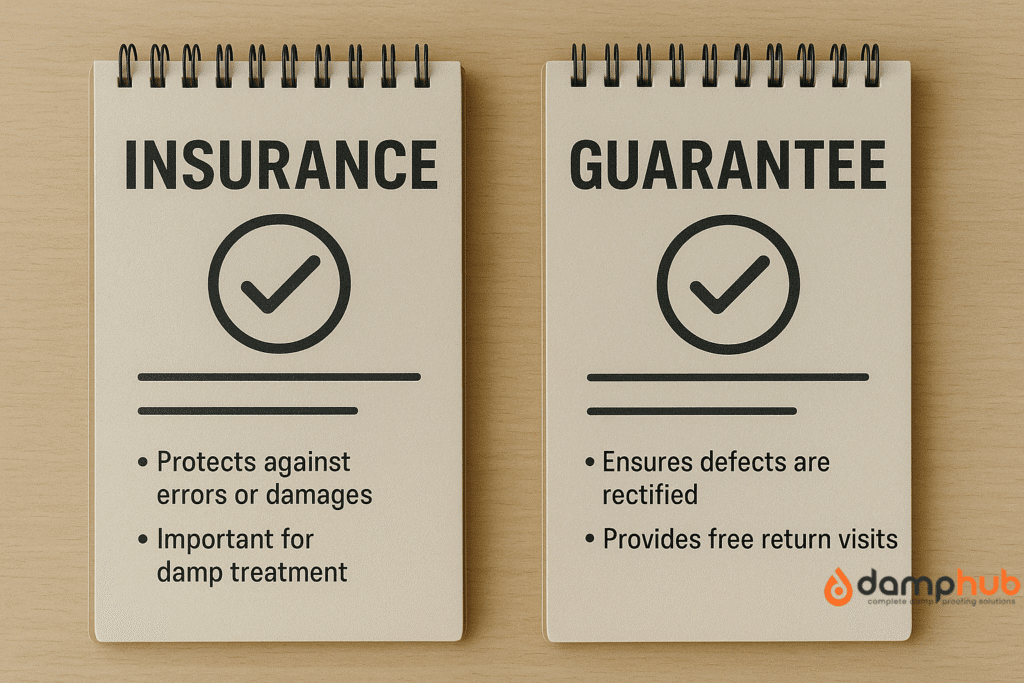
Step 6: Read Reviews and Check Local Experience
Local knowledge can make a big difference.
A damp surveyor near me who understands your region’s housing stock, common materials, and local weather conditions can often spot issues more effectively.
Look for:
- Reviews on Google, Trustpilot, or Checkatrade
- Testimonials on their website
- Examples of work on properties like yours
When reading reviews, pay attention to:
- Thoroughness of inspection
- Clarity of the report
- Communication and professionalism
- Whether the advice saved money or avoided unnecessary work
Step 7: Compare Costs Transparently
While cost matters, a cheap survey isn’t always good value. Free surveys are often sales tools used to push treatments.
A paid survey from an independent damp surveyor is more likely to be thorough and honest.
Ask for a clear breakdown of costs, including:
- On-site inspection
- Written report preparation
- Follow-up or consultation fees (if any)
Also, ask about cancellation policies or fees for rescheduling.
Step 8: Avoid These Common Pitfalls
Be cautious of surveyors who show these red flags:
- Promise quick fixes without a full diagnosis – Damp issues need proper investigation; anyone offering instant solutions without testing is cutting corners.
- Insist on immediate damp-proof course injections – This is a common upsell that may not address the actual cause, especially if no thorough assessment was done.
- Refuse to give a written report – Without a documented report, you have no evidence, no clear diagnosis, and no basis for comparison or action.
- Don’t use diagnostic tools or provide any evidence – Reliable surveyors use moisture meters, thermal imaging, and photographs to support their findings.
Focus more on damp surveyor jobs and recruitment than on client service – If their messaging is all about hiring and expanding rather than helping, it can suggest a volume-based business model, not one built on careful inspection.
These signs often point to a company more interested in sales than in solving your damp problem properly.
👉 Must read: Is It Worth Paying for a Damp Survey?
Summary: What to Look for in a Damp Surveyor
| Criteria | Why It Matters |
|---|---|
| Independent and unbiased | Avoid sales-led advice |
| Qualified (CSRT, CSTDB, PCA) | Ensures expertise |
| Uses modern diagnostic tools | Identifies hidden damp accurately |
| Provides written reports | Documentation for works, insurance, or sale |
| Local experience | Understands common local issues |
| Transparent pricing | No surprise costs |
| Positive client reviews | Proven reliability |
Final Thoughts
Choosing the right surveyor is a vital first step in protecting your home from moisture damage.
Whether you’re planning to renovate, investigating musty smells, or preparing to buy or sell, it pays to hire someone you trust.
Take your time, ask the right questions, and prioritise independence and expertise over convenience.
If you’re searching for an independent damp surveyor near me, don’t just rely on proximity—look for real experience and credentials.
A professional survey can save you thousands in the long run.
More importantly, it gives you the confidence to move forward with the right solution, without guesswork, hard sells, or unnecessary treatments.
If you’re serious about getting to the root of damp issues, a skilled and impartial surveyor is the best place to start.
👉 Must read: Who Can Carry Out a Damp Survey?
How Do I Choose a Damp Surveyor? Common Question Answered
What qualifications should a damp surveyor have?
A qualified damp surveyor should hold CSRT (Certified Surveyor in Remedial Treatment) status or be a member of the Property Care Association (PCA).
These are the most recognised credentials in the UK for diagnosing damp and timber issues.
Do chartered surveyors do damp surveys?
Some chartered surveyors offer damp inspections, but most are generalists.
If you need a detailed damp and timber report, it’s better to hire a specialist with CSRT or PCA accreditation.
What is the difference between a surveyor and a chartered surveyor?
A chartered surveyor is a regulated professional, accredited by RICS, while a general surveyor may not hold formal chartered status.
Chartered surveyors cover a wide range of property services, not just damp. For damp-specific issues, a CSRT or PCA-qualified specialist is usually more appropriate.
What will a damp surveyor do?
A damp surveyor will inspect your property for signs of excess moisture, timber decay, and poor ventilation, using specialist tools.
They’ll take moisture readings, identify causes, and provide a written report with recommendations.
Who carries out damp surveys?
Damp surveys are carried out by trained surveyors — usually PCA members, CSRT-qualified professionals, or independent damp specialists.
Some work for treatment companies; others operate independently with no sales agenda.
What damp meters do surveyors use?
Most use electronic moisture meters, often pin-type or surface (non-invasive), made by brands like Protimeter or Tramex.
They measure the relative moisture content in walls, floors, and timber.
What causes high damp readings on surveys?
High readings are usually caused by rising damp, leaks, condensation, or trapped moisture due to poor ventilation or impermeable materials.
Some high readings can also result from salts or previous treatments affecting the surface.
What to do before a damp survey?
Ensure access to lofts, floor voids, and affected walls. Move furniture away from problem areas and be ready to answer questions about the property.
Don’t try to cover up signs of damp — an honest inspection helps you more in the long run.
How to reduce damp readings in a house?
Improve ventilation, fix leaks, keep rooms heated, and avoid blocking air bricks or vents.
However, don’t attempt to reduce readings right before a survey — it won’t fix the underlying cause and could delay proper treatment.

